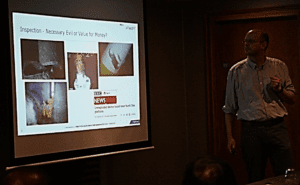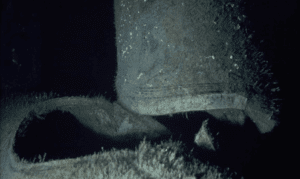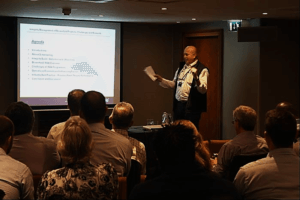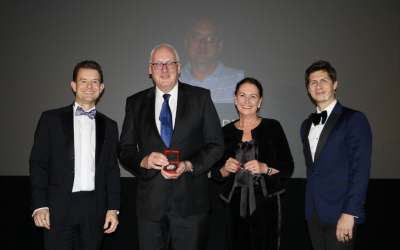George Gair of Subsea 7, commenced the evening session with a thought provoking theme ‘Subsea Inspection – The Future’ that considered many aspects of the current cost reduction environment, where there is a major focus now on how to reduce costs by incorporating new philosophies / technologies.
George Gair – Global Inspection Manager for Subsea 7 presenting to ICorr ABZ
Very clearly the drive is to produce new and robust methods of harvesting sensor data; subsea hardware suppliers are looking at increased in-suite equipment monitoring and intervention methods; the oceanographic community has developed remote seabed environmental monitoring systems. George highlighted many significant indicators that show a definite trend towards smarter systems, a key driver being to learn and incorporate inspection technologies from other industries such as Aerospace, Automotive, Medical and Power Generation, together with more efficient use of gathered data.
Significant Integrity Failure found by Advanced Subsea 7 ROV.
Monzar Najami and Hooman Takhtechian of Oceaneering International followed on with a similarly stimulating discussion on the theme of, ‘Integrity Management of Brownfield Projects: Challenges and Rewards’ highlighting the many important analysis and data gathering areas of modern RBI – Risk Based Inspection methodologies
Monzar Najami – Principal Inspection Engineer of Oceaneering International
The presenters informed the large audience, that the greatest challenge to developing and implementing an asset integrity program during Brownfield development projects is the fact that project schedule and milestones often take primacy over integrity management processes, and in particular emerging vital integrity related interventions which can lead to conflict and disagreement. Any delays in the implementation of these activities impede the Integrity Management Programme (IMP) and increase the level of risk to the facilities in the operating stage.
Key stages in an IMP project were highlighted as:
- Identify stakeholders early in the project (project team, operations, planners, site personnel)
- Define strategies and processes and add activities to the construction plan (integrated project activity approach)
- Analyze historical data (collect the available list of failures, anomalies and review root cause analysis)
- Material fitness for new process (review threats assessment and existing material suitability)
- Baseline inspections: Get in early (define scope and input your inspection requirements in the manufacturer’s ITP)
- Brownfield revamp activities: Scrutinize output (repair recommendations were challenged and resulted in major cost saving, and change in material selection)
- Tagging and RBA output alignment with the existing CMMS (understand the existing Computerized Maintenance Management System prior to your RBA to avoid major re-work)
- Deployment of new and advanced inspection technologies (to achieve major cost savings)
For copy of the newsletter please click link below:
Aberdeen Newsletter – April 2018 Meeting






